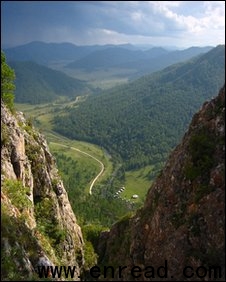DNA检测发现前所未知的古人种
(单词翻译:单击)
Scientists have identified a previously1 unknown type of ancient human through analysis of DNA2 from a finger bone unearthed3 in a Siberian cave.
科学家们通过对一块西伯利亚某山洞出土的指骨进行分析,发现一种前所未知的古人种。

The finger bone was unearthed in 2008 at Denisova Cave
The extinct "hominin" (human like creature) lived in Central Asia between 48,000 and 30,000 years ago.
An international team has sequenced genetic4 material from the fossil(化石,僵化的事物) showing that it is distinct from(与……不同) that of Neanderthals and modern humans.
Details of the find, dubbed5 "X-woman", have been published in Nature journal.
Ornaments6(装饰品) were found in the same ground layer as the finger bone, including a bracelet7(手镯) .
Professor Chris Stringer, human origins researcher at London's Natural History Museum, called the discovery "a very exciting development".
"This new DNA work provides an entirely8 new way of looking at the still poorly-understood evolution of humans in central and eastern Asia."
The discovery raises the intriguing9(迷人的,有趣的) possibility that three forms of human - Homo sapiens(智人,现代人) , Neanderthals and the species represented by X-woman - could have met each other and interacted in southern Siberia.
The tiny fragment(碎片) of bone from a fifth finger was uncovered by archaeologists(考古学家) working at Denisova Cave in Siberia's Altai Mountains in 2008.
An international team of researchers extracted mitochondrial(线粒体) DNA from the bone and compared the genetic code with those from modern humans and Neanderthals.
Origin unknown
Mitochondrial DNA comes from the cell's powerhouses and is passed down the maternal10 line only.
The analysis carried out by Johannes Krause from the Max Planck Institute for Evolutionary11 Anthropology12 in Leipzig, Germany, and colleagues revealed the human from Denisova last shared a common ancestor with modern humans and Neanderthals about one million years ago.
This is known as the divergence13(分歧) date; essentially14, when this human's ancestors split away from the line that eventually led to Neanderthals and ourselves.
The Neanderthal and modern human evolutionary lines diverged15 much later, around 500,000 years ago. This shows that the individual from Denisova is the representative of a previously unknown human lineage(血统,家系) that derives16 from a hitherto(迄今,至今) unrecognised migration17 out of Africa.
"Whoever carried this mitochondrial genome out of Africa about a million years ago is some new creature that has not been on our radar18 screens so far," said co-author Professor Svante Paabo, also from the Max Planck Institute for Evolutionary Anthropology(进化人类学) .
The divergence date of one million years is too young for the Denisova hominin to have been a descendent19 of Homo erectus(直立人) , which moved out of Africa into Asia some two million years ago.
And it is too old to be a descendent of Homo heidelbergensis(海德堡人) , another ancient human thought to have originated around 650,000 years ago. However, for now, the researchers have steered20(驾驶,控制) away from describing the specimen21 as a new species.
Dr Krause said the ground layer in which the Denisova hominin fragment was found contain tools which are similar to those made by modern humans in Europe.
 收听单词发音
收听单词发音
1
previously

|
|
| adv.以前,先前(地) | |
参考例句: |
|
|
|
2
DNA

|
|
| (缩)deoxyribonucleic acid 脱氧核糖核酸 | |
参考例句: |
|
|
|
3
unearthed

|
|
| 出土的(考古) | |
参考例句: |
|
|
|
4
genetic

|
|
| adj.遗传的,遗传学的 | |
参考例句: |
|
|
|
5
dubbed

|
|
| v.给…起绰号( dub的过去式和过去分词 );把…称为;配音;复制 | |
参考例句: |
|
|
|
6
ornaments

|
|
| n.装饰( ornament的名词复数 );点缀;装饰品;首饰v.装饰,点缀,美化( ornament的第三人称单数 ) | |
参考例句: |
|
|
|
7
bracelet

|
|
| n.手镯,臂镯 | |
参考例句: |
|
|
|
8
entirely

|
|
| ad.全部地,完整地;完全地,彻底地 | |
参考例句: |
|
|
|
9
intriguing

|
|
| adj.有趣的;迷人的v.搞阴谋诡计(intrigue的现在分词);激起…的好奇心 | |
参考例句: |
|
|
|
10
maternal

|
|
| adj.母亲的,母亲般的,母系的,母方的 | |
参考例句: |
|
|
|
11
evolutionary

|
|
| adj.进化的;演化的,演变的;[生]进化论的 | |
参考例句: |
|
|
|
12
anthropology

|
|
| n.人类学 | |
参考例句: |
|
|
|
13
divergence

|
|
| n.分歧,岔开 | |
参考例句: |
|
|
|
14
essentially

|
|
| adv.本质上,实质上,基本上 | |
参考例句: |
|
|
|
15
diverged

|
|
| 分开( diverge的过去式和过去分词 ); 偏离; 分歧; 分道扬镳 | |
参考例句: |
|
|
|
16
derives

|
|
| v.得到( derive的第三人称单数 );(从…中)得到获得;源于;(从…中)提取 | |
参考例句: |
|
|
|
17
migration

|
|
| n.迁移,移居,(鸟类等的)迁徙 | |
参考例句: |
|
|
|
18
radar

|
|
| n.雷达,无线电探测器 | |
参考例句: |
|
|
|
19
descendent

|
|
| adj. 下降的, 降落的, 世袭的 n. 后代,子孙 =descendant | |
参考例句: |
|
|
|
20
steered

|
|
| v.驾驶( steer的过去式和过去分词 );操纵;控制;引导 | |
参考例句: |
|
|
|
21
specimen

|
|
| n.样本,标本 | |
参考例句: |
|
|
|
- 上一篇:任天堂揭幕3D版DS游戏机
- 下一篇:珍藏版“辛德勒名单”150万英镑待售




